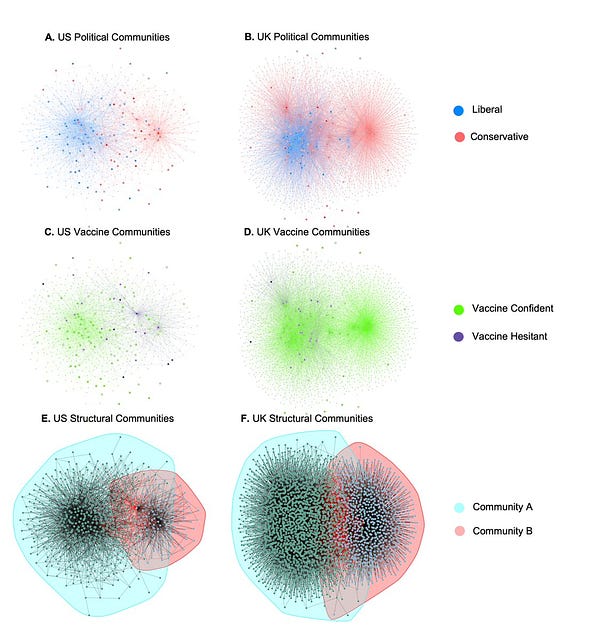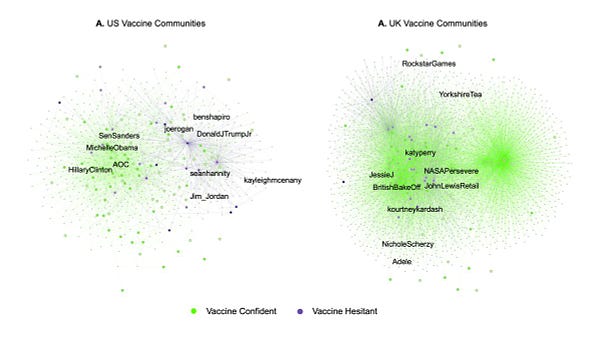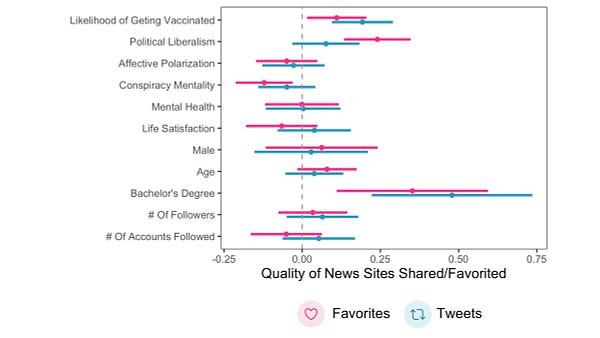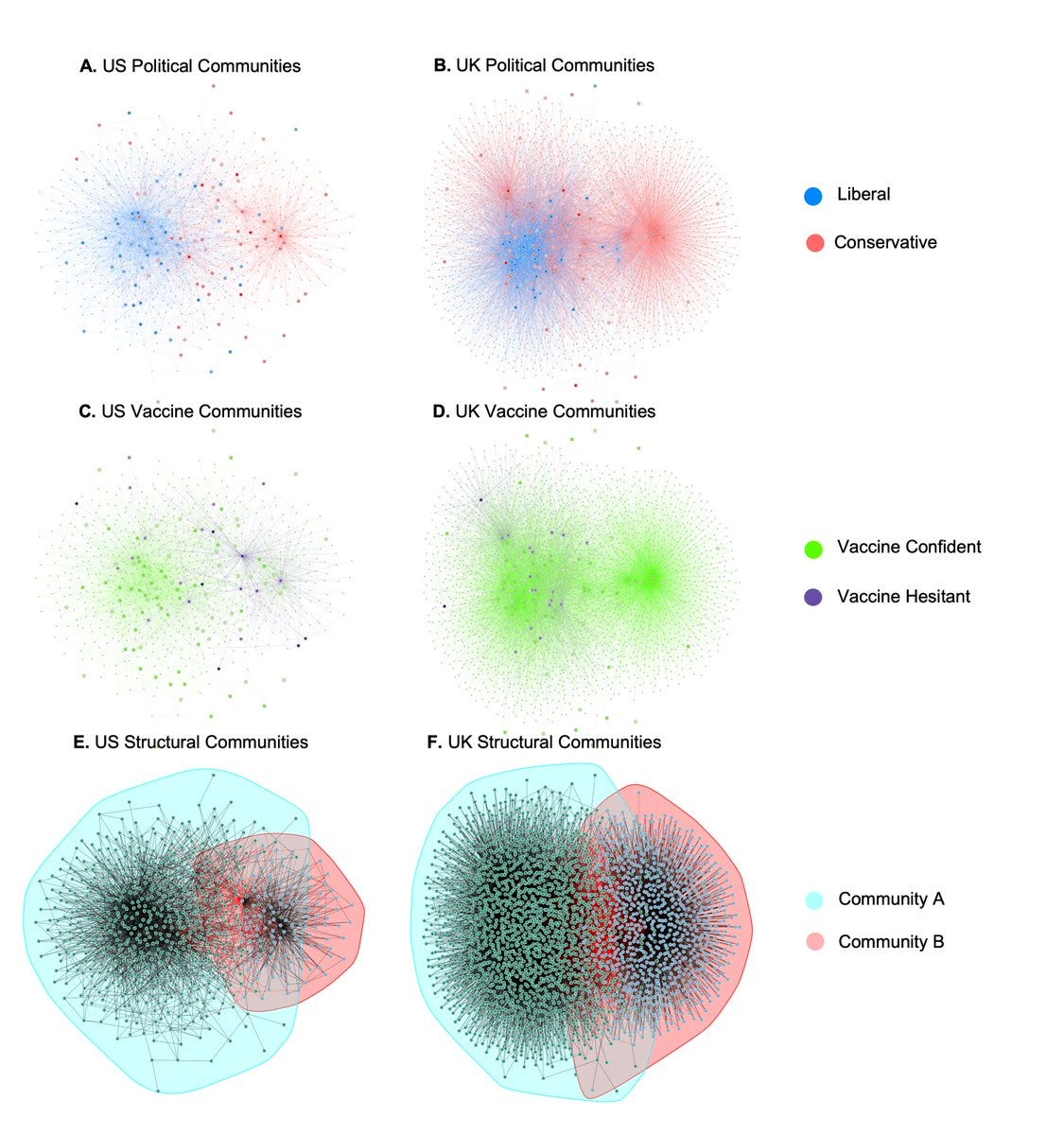Social media and vaccine hesitancy
Why social media behavior is associated with Vaccine hesitancy; New op-eds on group-oriented leadership and succeed on New Year Resolutions; Videos on social identity & cult psychology
During the pandemic, there has been a huge debate about the role of social media in public health. While these platforms now have nearly five billion users, it was unclear if they were doing enough to foster healthy behaviors or whether the spread of misinformation might cause serious harm.
In our new paper “Social Media Behavior is Associated with Vaccine Hesitancy,” by Steve Rathje, James He, Jon Roozenbeek, Jay Van Bavel, and Sander van der Linden, we explored how attitudes about the COVID-19 vaccine were correlated with people’s Twitter behavior. We collected two samples of survey data about people’s political beliefs and vaccine attitudes, and linked them to data about their Twitter usage. We collected data from both the US and the UK, so we could analyze cross-cultural differences.




We found that favoriting, following, and retweeting news URLs that were rated as low-quality sources by fact-checkers and journalists was associated with vaccine hesitancy. In other words, interacting with online news sources that are known to share false or misleading information is linked to vaccine hesitancy. We do not know if these sources caused hesitance. But our results persisted even when statistically controlling for a number of demographic variables, such as political ideology, gender, and age.
Moreover, following US Republican politicians and conservative media sources was associated with vaccine hesitancy. In fact, our most vaccine hesitant participants were followers of the Twitter accounts of prominent people such as Candace Owens, Joe Rogan, Ben Shapiro, and Tucker Carlson. The most vaccine-confident participants in our sample, on the other hand, were followers of Democratic politicians on Twitter, such as Vice President Kamala Harris and Hillary Clinton.
But this was largely an American issues. Following conservative politicians and media sources in the UK was not associated with vaccine hesitancy — suggesting that attitudes about the vaccine in the UK were less politically polarized.
We also conducted network analysis, and observed “echo chambers” whereby vaccine hesitant versus confident people seemed to cluster into different online networks. The vaccine echo chambers in the US seemed to resemble political echo chambers, with the vaccine-hesitant Twitter network overlapping with the conservative Twitter network. Moreover, centrality within the conservative community on Twitter predicted greater vaccine hesitancy. Again, we did not find this result in the UK, revealing that polarization about vaccine attitudes appeared to be unique to the US.
These cross-cultural differences between the US and the UK suggest that cues from partisan political elites and misinformation sources (rather than conservative ideology alone) likely played a major role in shaping vaccine attitudes. Overall, this study reveals how online “influencers,” political elites, and misinformation are involved in polarized public health attitudes. It also reveals that perhaps things could have turned out better in the US.
Outreach
One month into 2023, have your new year resolutions failed yet? As many as 80% of people fail to keep their New Year’s resolutions by February. To help people get a better grip on their goals, Jay and Dominic Packer offered some much needed advice. They suggested that people should join social groups where your goals and intentions are supported by group norms.
Read here for more details.


In another column that Jay and Dominic wrote recently, they explained the power of the group-oriented leader. They argued compared to other types of leaders such as individually-oriented leaders, group-focused leaders are more able to create a common vision and a sense of camaraderie for their teams. As a result, these teams often have higher levels of group performance and feel more effective.
Read the column here to learn more about how to think like a group-oriented leaders.


Podcasts
On the final Season 1 episode of NeoAcademia explores science communication in psychology, Steve Rathje and Natasha Mott talked about the psychology of academic social media. The topics they discussed includes what goes viral on social media, future science communication and the role of “academic NPCs”. Listen to the podcast here if you missed it!

On a recent episode of Trust Me Podcast, Jay discussed various aspects of groupthink, social identity and cult psychology. They talked about the good and bad about groups and organizations, and how we can make them healthier and less oppressive. Listen to the full episode here:


Videos and Photos
Why do people hold on to false beliefs? In order to answer that one needs to understand how social identity is a crucial part of how we view ourselves. Check out the series of animation made for The Power of Us written by Jay and Dominic here for some interesting stories and learn more about social identity.

Yet there is another video to check out on this topic. Jay and Steve recently created a TikTok video together explaining why people join cults. Follow @stevtpsychology on TikTok for more clips on social psychology.
Stepping away from the academic world for a second, it is exciting for us to see our former PhD student Anni Sternisko (third from the left) at the Golden Globe red carpet with her husband Jonathan Wang (fourth from the left), who produced the wonderful movie, Everything, Everywhere, All at Once. You can look for them on the red carpet at the Academy Awards where the movie was nominated for 11 Awards—the most of any movie produced last year!


As always, if you have any photos, news, or research you’d like to have included in this newsletter, please reach out to the Lab Manager (nyu.vanbavel.lab@gmail.com) who writes our monthly newsletter. We encourage former lab members and collaborators to share exciting career updates or job opportunities—we’d love to hear what you’re up to and help sustain a flourishing lab community. Please also drop comments below about anything you like about the newsletter or would like us to add.
That’s all, folks—thanks for reading and we’ll see you next month!







As a long time nurse.. who’s given countless vaccines and taken them myself, I’ll never trust the vaccine industry again. They’ve shown themselves. Hesitancy isn’t from media... it’s from the lies PH themselves told. And to deny natural immunity? Yeah... we’re being ruled by fools. They did this to themselves and then wonder... why doesn’t the public trust us anymore? Duh